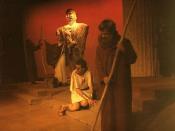Antigone a play of antithethesis and conflict
Sophocles' Antigone, in its later phases is no longer about the conflict of law. It is about stubbornness and self will, about the sin of refusing to listen; about a man who has never been told.
In Sophocles The Theban Plays conflict of law, presents the initial disturbance within Thebes. Creon, King of Thebes, refuses to bury the body of Polynices, for in his eyes Polynices is his country's enemy. Thus, despite breaking the laws of the gods, Creon holds his power higher than that of God and heavens and enforces his law. As the story expands, Sophocles explores on the ignorance presented by Creon and Antigone.
In the Theban plays it is found that it is impossible to defeat an ignorant man, or woman in argument until they are shown the error of there ways. It is this ignorance, that establishes the notion of the sin and punishment that both Creon and Antigone face due to their stubbornness and self will.
Antigone holds her love of family, and respect for the dead, elevated beyond the laws of Creon, whom she believes, has no righteous justification to close his eyes to the honor of the deceased. In her determination to fulfill Polynices' rights, she runs directly into Creon's attempts to re-establish order. This leads to encounters of severe conflict between the dissimilarities of the two, creating a situation whereby both Creon and Antigone expose their stubbornness and self will.
It is Antigone's morality, which drives her to betray the laws of man, in order to honor the laws of God. Knowing and comprehending the consequences of defying Creon's ruling do not restrain the intensity of Antigone's self will, yet it feeds her hunger to achieve her principles as demonstrated in their confrontation (Antigone...


